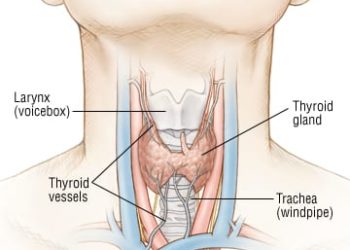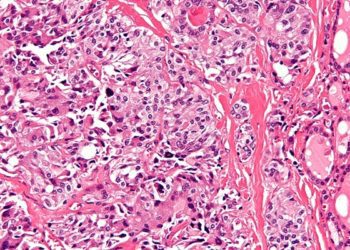Postoperative treatment without radioiodine has noninferior outcomes following thyroidectomy
1. Patients with low-risk thyroid cancer undergoing thyroidectomy, who did not receive radioiodine post-operatively, did not show inferior functional, structural, and biological recurrence outcomes.
2. Patients with higher thyroglobulin levels were shown to have a higher frequency of functional, structural, and biological abnormalities.
Evidence Rating Level: 1 (Excellent)
Study Rundown: Following thyroidectomy, the standard postoperative treatment regimen for patients with low-risk thyroid cancer is ablation using radioiodine (iodine-131) after recombinant human thyrotropin injection to prevent a recurrence. However, retrospective studies have suggested that radioiodine may not be necessary in improving recurrence outcomes in low-risk cases. The objective of this phase 3 ESTIMABL2 randomized control trial was to evaluate whether the absence of radioiodine would yield noninferior outcomes. Following thyroidectomy, patients were randomized to either receive ablation with postoperative radioiodine or no radioiodine. The primary objective measured the percentage of “events”, which were related to functional, structural, and biological abnormalities at 3 years follow-up. These endpoints were based upon measures such as radioiodine uptake, ultrasonography imaging, thyroglobulin and thyroglobulin antibody levels, and incidence of recurrence. Secondary endpoints analyzed the quality of life and anxiety measures. The study found that both groups had similar proportions of patients with a primary event supporting that the group receiving no radioiodine was non-inferior. A correlation was also found between those with higher thyroglobulin levels with a greater frequency of events. Neither group experienced adverse events related to treatment. Together, this study supports the discontinued use of radioiodine following thyroidectomy in patients with low-risk thyroid cancer. The results of this study are potentially limited by a short follow-up time.
Click to read the study in NEJM
Relevant Reading: Low-risk differentiated thyroid cancer and radioiodine remnant ablation: a systematic review of the literature
In-Depth [randomized controlled trial]: In this phase 3 randomized control trial named Essai Stimulation Ablation 2 (ESTIMABL2), 730 patients with low-risk thyroid cancer (differentiated, T1a or 1b status, N0 or Nx) who underwent curative resection by thyroidectomy were randomly assigned to receive either postoperative radioiodine (1.1 GBq) following the second dose of recombinant human thyrotropin or no radioiodine. Groups were stratified for the trial site and lymph node status. Patients were assessed using ultrasonography, and for serum thyroglobulin and thyroglobulin antibody levels until the follow-up period of 3 years after randomization. Patients receiving radioiodine also underwent whole-body scanning to assess any abnormal foci of radioiodine uptake. The primary endpoint was the proportion of patients that encountered an event, which comprised of either abnormal radioiodine uptake on whole-body scanning (functional), abnormal ultrasonography (structural), or excessive thyroglobulin or thyroglobulin antibody levels (biological). Secondary endpoints assessed, via questionnaire, measures of quality of life, anxiety, fear or recurrence, and gland dysfunction. The study found that 4.1% of the group receiving radioiodine experienced an event, compared to 4.4% in the no-radioiodine group, yielding a non-significant between-group difference of -0.3% (95% confidence interval [CI], -2.7 to 2.2). Similar scores were found across all secondary endpoint measures across both groups. When assessed for prognostic factors for primary event occurrence, the study found that patients with higher thyroglobulin levels (>1 ng/mL) were at higher risk. Furthermore, no differences in mutation analyses and adverse events were found. Taken together, the study found that not administering radioiodine was not inferior to the current standard practice of radioiodine administration, potentially sparing this subgroup of low-risk thyroid cancer patients from recommended radioiodine treatment.
Image: PD
©2022 2 Minute Medicine, Inc. All rights reserved. No works may be reproduced without expressed written consent from 2 Minute Medicine, Inc. Inquire about licensing here. No article should be construed as medical advice and is not intended as such by the authors or by 2 Minute Medicine, Inc.









